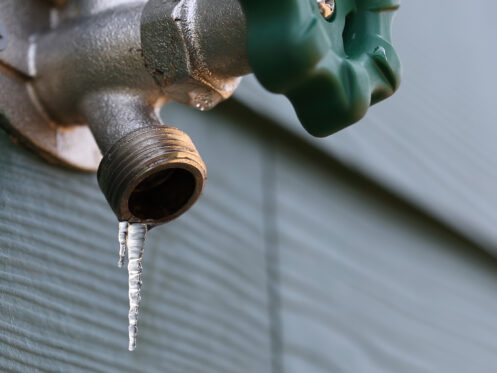Colorado is home to some of the most frigid temperatures. Consider these important tips for how to prevent frozen pipes in Denver’s winter months.
Find and Repair Leaks
Before the start of cold weather, inspect your pipes for leaks. If you find any, repair them promptly. Leaky faucets can cause water to freeze and expand in your pipes. The pipes could then burst, putting your home at risk of expensive interior water damage.
Insulate the Pipes
You can also prevent your pipes from freezing during the long winter in Denver by insulating them. Some of the best materials to use for pipe insulation include spray foam and fiberglass covers. Make sure you insulate those pipes in unheated areas like your basement, crawlspace or garage.
Use Pipe Sleeves
You can also use pipe sleeves to insulate exposed pipes. They are typically made from materials like foam and fiberglass. They are also relatively affordable, costing only a few dollars per linear foot, depending on what material they are made from, and found at most big box hardware stores.
Insulate the Walls and Attic
Additionally, you should insulate your home’s walls and attic. Insulation keeps the pipes inside the walls warm. You should check the insulation before the start of winter and add more if your old insulation is worn out, wet or damaged.
Seal Cracks and Gaps
Openings around the pipes likewise can let in frigid air. To prevent cold air from freezing your pipes, be sure to seal any gaps where your pipes enter the walls or exit to the outside. Use weatherstripping or caulk to seal them.
Keep Your Garage Door Closed
Your garage door can easily let in cold air as well. If you have water supply lines in the garage, keep the doors tightly closed to prevent frigid drafts. You may find it helpful to maintain or repair your garage door before winter for this reason.
Let Your Faucets Drip
During blasts of polar-like weather, keep the faucets in your kitchen, bathroom and utility room on a slow drip. This slow drip will keep water moving through the pipes, preventing it from freezing. Drip your faucets if the outdoor temperature will remain under 28 degrees Fahrenheit for longer than three hours.
Drip Water From the Farthest Faucet
Dripping water from the faucet that is farthest from the main water valve can also mitigate the risk of pipes freezing. It keeps water moving through your pipes, lowering the chances of cold air from freezing them.
Set Your Thermostat Above 55 Degrees Fahrenheit
You should also be mindful of the temperature at which you set your furnace’s thermostat. To protect your pipes, you should keep that temperature at 55 degrees Fahrenheit. Keep it above 55 degrees even when you are not at home.
Maintain a Consistent Indoor Temperature
Likewise, avoid turning your thermostat up and down frequently. Temperature drops can put your pipes at risk of getting too cold and freezing. Once you set the thermostat temperature, keep it at that setting to ensure your pipes stay warm.
Keep the Cabinet Doors Open
When the temperature outside falls below 28 degrees for several hours or longer, you should keep the cabinet doors under your kitchen and bathroom sinks open. The open doors allow warm air to come inside the cabinets, circulate around the pipes and prevent freezing.
Install and Use Pipe Heating Cables
Heating cables provide you with an easy way to keep the pipes in your home warm. They are small, flexible cables that attach to the exterior of the pipes. You can also use these cables to defrost or melt frozen or frosted pipes.
Use Space Heaters
You can use space heaters to keep pipes warm in areas where they might otherwise freeze. You should avoid leaving these heaters unattended. Also, follow the manufacturer’s guidelines on how to use them safely to avoid the chance of them overheating and catching your house on fire.
Disconnect and Drain Outdoor Hoses
Before frigid weather arrives, remove and drain hoses connected to your home’s outdoor faucets. Water in the hoses can freeze, causing damage not only to the hoses but also the faucets. It can also cause pipes inside your home to burst.
Cover the Outdoor Faucets
Faucet covers go a long way in protecting your outdoor faucets from freezing. They usually are made from Styrofoam, easy to install and insulate the faucets during cold weather, thereby lowering the chances of the faucets or pipes connected to them freezing.
Install Frost-proof Outdoor Faucets
You can mitigate the risk of burst pipes by installing frost-proof outdoor faucets. These faucets are reasonably priced and often contain durable materials like brass or stainless steel that can tolerate the coldest of temperatures. You can also find them at most hardware stores or big box retailers.
Keep Your Inside Doors Open
Keeping the doors inside your home open encourages warm air from your furnace to circulate freely and keep the pipes warm. Avoid shutting the doors to rooms like your bathroom and utility room during frigid weather to ensure those areas and the pipes in them stay warm.
Close the Foundation Vents
Cold air that gets inside of your crawlspace or foundation can contribute to pipes freezing. Before winter starts, close the vents on your home’s foundation. This tactic keeps out cold air and can help ensure the pipes do not freeze.
Install a Sump Pump
If you live in a flood-prone area in Denver, you can keep water from freezing by install a sump pump in your home. You can quickly remove water that gets inside of the crawlspace or basement and minimize the risk of pipes in this part of the house freezing.
Use a Smart Thermostat
A smart thermostat can become a valuable asset in your home to protect your pipes during the winter. You can maintain a consistent temperature and monitor your home’s furnace remotely. You can also create a heating schedule to keep your house and plumbing warm.
Stay Informed About the Weather
You can remain proactive about keeping your pipes warm by staying informed about the weather. If the weather reports call for frigid weather, you can take decisive steps like insulating the pipes, turning off outdoor faucets and dripping the inside faucets.
Upgrade Your Plumbing System
If your home has an old and outdated plumbing system, you can lower the risk of it freezing by upgrading to a new plumbing system. New plumbing fixtures can feature more durable materials and better designs that resist freezing and hold up better in the cold Denver winters.
Choose Us for Your Winter Pipe Services
At Horizon Services, we have more than 25 years of experience helping Denver homeowners keep their pipes in good condition every winter and throughout the year. We offer emergency repair services 24/7. Our customers also receive regular rates for our services from 7:00 in the morning through 7:00 at night.
The experienced team we have working for us services plumbing, heating and air conditioning systems. We also repair garage doors and offer dryer vent cleaning services. Contact us at Horizon Services to learn more about how we can help you keep your pipes from freezing this winter.


